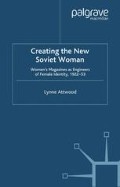Abstract
As we have seen, Marxists were in agreement that women’s equality could only be achieved once they worked alongside men in social production, and were liberated from the confines of the family. As Engels put it: ‘the emancipation of women and their equality with men are impossible and must remain so as long as women are excluded from socially productive work and restricted to housework, which is private. The emancipation of women becomes possible only when women are enabled to take part in production on a large, social scale, and when domestic duties require their attention only to a minor degree.’1 In due course the family would, in effect, be ‘nationalised’, with women’s domestic functions taken over by state institutions. In this chapter we will look at how these twin goals, to draw women into the work force and to free them from family duties, were presented to readers of Rabotnitsa and Krest’yanka in the 1920s.
Access this chapter
Tax calculation will be finalised at checkout
Purchases are for personal use only
Preview
Unable to display preview. Download preview PDF.
Notes
F. Engels (1972), The Origins of the Family, Private Property and the State, p.152.
I. Armand (1975), Stat’i, rechi, pis’ma, p. 108.
A. Artyukhina (1926), ‘Sorok protsentov vsekh bezrabotnykh na birzhakh truda -zhenshchiny’: Kak pomoch’ im?’, Rabotnitsa, no. 21, p. 3.
Bol’shakov (1926), ‘Mozhet li byt’ zhenshchina slesarem’, Rabotnitsa, no. 8, p. 20.
Letter by N. Zyablikova, in collection of letters under heading ‘Mozhet byt’ zhenshchina slesarem (otvety na stat’y v zhurnale Rabotnitsa, no. 7 [sic])’ (1926), Rabotnitsa, no. 11, p. 17.
Letter by N. Zyabllkova in collection of letters under heading ‘Mozhet byt’ zhenshchina slesarem (otvety na stat’y v zhurnale Rabotnitsa, no. 7)’ (1926), Rabotnitsa, no. 11, p. 17.
Svet’ (1925), ‘Rabochim nado pomoch’ svoim zhenam’, Rabotnitsa, no. 13, p. 17.
Quoted by A. Itkina (1982), ‘Narkom. Aleksandra Kollontai’, in Zhenshchiny Russkoi revolyutsii, p. 198.
See, for example, Timchenko (1926), ‘Put’ k novomu bytu’, under general heading ‘Chto nam pishut o byte’, Rabotnitsa, no. 23, pp. 15–16.
M. Vilenskaya (1926), ‘Obshchimi silami’, Krest’yanka, no. 3, p. 4.
K. Ivanova (1926), ‘Stali inye’, Krest’yanka, no. 3, p. 4.
See also M. Vilenskaya (1926), ‘Obshchimi silami’, Krest’yanka, no. 3, p. 4.
For example, see M. Krasnova (1926), ‘Poleznyi urok’, Krest’yanka, no. 17, p. 7.
Valova (1926), ‘Tam, gde net yaslei’, under rubric ‘Gde eshche plokho’, Krest’yanka, no. 17, p. 7.
V. Konko (1926), ‘Blizitsya leto…- napominaite potrebobshchestvam o yaslakh’, Krest’yanka, no. 7, p. 14.
V. Lebedeva (1925), ‘Okhrana materinstva i mladenchestva’, Krest’yanka, no. 21, p. 3.
Mariya Il’ina (1925), ‘Za sebya postoyali’, Krest’yanka, no. 23, pp. 13–15.
Kollontai (1991), ‘Revolyutsiya byta’, reproduced in Iskusstvo Kino, no. 6, p. 106.
N. Krupskaya (1925), ‘Rabotnitsa i delo obshchestvennogo pitaniya’, Rabotnitsa, no. 3, p. 11.
M. Zarina (1924), ‘Revolyutsiya byta: Stroitel’stvo narodnogo pitaniya’, Rabotnitsa, no. 6, pp. 25–6.
See R. Stites (1989), Revolutionary Dreams, pp. 200–4.
M. Zarina (1924), ‘Revolyutsiya byta: Stroitel’stvo narodnogo pitaniya’, Rabotnitsa, no. 6, pp. 25–6.
E. Kravchenko (1926), ‘Soobshcha mozhno svoei bednosti pomoch’, Krest’yanka, no. 6, p. 15.
See also A. Ioffe (1928), ‘Zhenskaya kommuna’, Krest’yanka, no. 11, p. 5.
In some of its reports on communal housing, Rabotnitsa seemed to wilfully mix up the genuine ventures with those which had come about simply because of the housing shortage. See, for example, the report by N. Sanzhar’ (1923), ‘V domakh dlya rabochikh’, Rabotnitsa, no. 7, pp. 25–6.
M. Yunprof (1925), ‘Zhilishchnyi vopros’, under general heading ‘U yarsevskikh tekstil’shchits’, Rabotnitsa, no. 12, p. 11.
Z. Chagan (1926), ‘Zhilishchnyi krizis’, Rabotnitsa, no. 3, p. 8.
Author information
Authors and Affiliations
Copyright information
© 1999 Lynne Attwood
About this chapter
Cite this chapter
Attwood, L. (1999). Work versus Family. In: Creating the New Soviet Woman. Studies in Russian and East European History and Society. Palgrave Macmillan, London. https://doi.org/10.1057/9780333981825_2
Download citation
DOI: https://doi.org/10.1057/9780333981825_2
Publisher Name: Palgrave Macmillan, London
Print ISBN: 978-1-349-41576-2
Online ISBN: 978-0-333-98182-5
eBook Packages: Palgrave Social & Cultural Studies CollectionSocial Sciences (R0)

